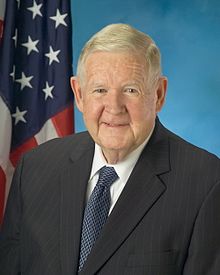John Murtha | |
|---|---|
 Murtha in 2008 | |
| Member of the U.S. House of Representatives from Pennsylvania's 12th district | |
| In office February 5, 1974 – February 8, 2010 | |
| Preceded by | John Saylor |
| Succeeded by | Mark Critz |
| Member of the Pennsylvania House of Representatives from the 72nd district | |
| In office May 20, 1969 – February 5, 1974[1] | |
| Preceded by | Edward McNally (elect)[a] |
| Succeeded by | James Whelan |
| Personal details | |
| Born | John Patrick Murtha Jr. June 17, 1932 New Martinsville, West Virginia, U.S. |
| Died | February 8, 2010 (aged 77) Arlington, Virginia, U.S. |
| Resting place | Grandview Cemetery |
| Political party | Democratic |
| Spouse | Joyce Murtha |
| Children | 3 |
| Education | Washington and Jefferson College University of Pittsburgh (BA) Indiana University of Pennsylvania |
| Civilian awards | |
| Signature | |
| Military service | |
| Allegiance | |
| Branch/service | |
| Years of service | 1952–1990 |
| Rank | |
| Battles/wars | Vietnam War |
| Military awards | |
| a. ^ McNally was elected in November 1968. However, he died shortly after being elected, and thus was never sworn in.[3] | |
John Patrick Murtha Jr. (/ˈmɜːrθə/ MUR-thə; June 17, 1932 – February 8, 2010) was an American politician from the Commonwealth of Pennsylvania. Murtha, a Democrat, represented Pennsylvania's 12th congressional district in the United States House of Representatives from 1974 until his death in 2010.[4][5][6][7] He is the longest-serving member of the United States House of Representatives ever elected from Pennsylvania.
A former Marine Corps officer, Murtha was the first Vietnam War veteran elected to the U.S. House of Representatives. A member of the Pennsylvania House from 1969 to 1974, he narrowly won a special election to Congress in 1974 and was successively reelected every two years until his death. In the first decade of the 21st century, Murtha had been best known for his calls for a withdrawal of American forces in Iraq, as well as questions about his ethics.[8]
In 2006, after the Democrats won control of the House of Representatives in the 2006 midterm elections he made an unsuccessful bid to be elected House Majority Leader during the 110th Congress (2007–2009) with the support of the new House Speaker, Nancy Pelosi, losing to Steny Hoyer.[9][10] He lost to Steny Hoyer of Maryland.[11] As the Democrats became the majority party in the House in 2007, Murtha re-assumed his chairmanship of the House Appropriations' Defense Subcommittee. He had previously chaired this subcommittee from 1989 to 1995 and served as its ranking member from 1995 to 2007.
- ^ "Murtha Entitled To House Vote?". Indiana Gazette. Indiana, Pennsylvania. February 26, 1974. p. 1.
Despite some lingering confusion about the nature in which it was done, it appears now that John P. Murtha has officially resigned as a member of the Pennsylvania General Assembly, effective February 5 [...] The new U.S. Representative from the 12th Congressional District was sworn in as a member of Congress last Wednesday [February 20].
- ^ Garber, Phil (June 21, 2013). "Navy's highest civilian honor goes to Frelinghuysen". Morris NewsBee News. New Jersey Hills Media Group. Retrieved July 20, 2013.
- ^ "Legislature to Convene for Battles". The Gettysburg Times. Associated Press. January 7, 1969.
- ^ Obituary New York Times, February 9, 2010.
- ^ Obituary Los Angeles Times, February 9, 2010.
- ^ Obituary Washington Post, February 9, 2010.
- ^ Obituary London Independent, February 10, 2010.
- ^ Jackson, Peter. "Iraq war critic Murtha, 77, wasn't shy about seeking earmarks". (February 9, 2010) nwi.com. Retrieved February 11, 2010.
- ^ "Murtha to Run for House Majority Leader if Dems Prevail in November". FOXNews. June 9, 2006. Archived from the original on October 18, 2006. Retrieved October 28, 2006.
- ^ "Pelosi supports Murtha for majority leader". CNN. November 12, 2006. Retrieved November 13, 2006.
- ^ "Democrats defy Pelosi, elect Hoyer House leader". Reuters. November 16, 2006. Retrieved November 16, 2006.[dead link]